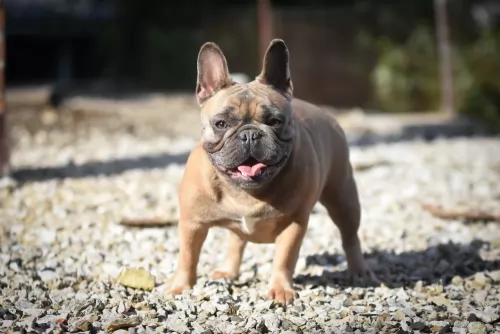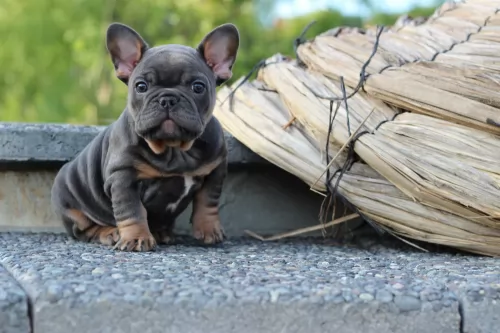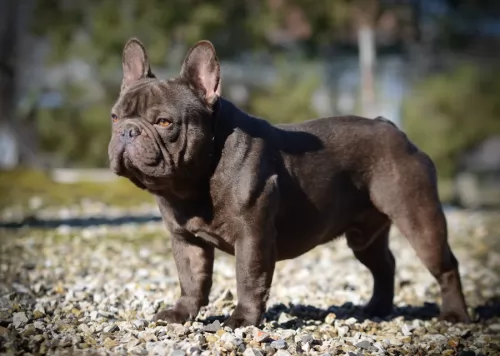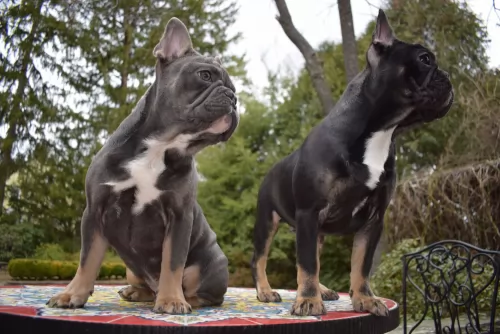 Petzlover
Petzlover French Bulldog is originated from France but Australian Terrier is originated from Australia. French Bulldog may grow 9 cm / 4 inches higher than Australian Terrier. French Bulldog may weigh 6 kg / 14 pounds more than Australian Terrier. French Bulldog may live 3 years less than Australian Terrier. Both French Bulldog and Australian Terrier has almost same litter size. French Bulldog requires Low Maintenance. But Australian Terrier requires Moderate Maintenance
French Bulldog is originated from France but Australian Terrier is originated from Australia. French Bulldog may grow 9 cm / 4 inches higher than Australian Terrier. French Bulldog may weigh 6 kg / 14 pounds more than Australian Terrier. French Bulldog may live 3 years less than Australian Terrier. Both French Bulldog and Australian Terrier has almost same litter size. French Bulldog requires Low Maintenance. But Australian Terrier requires Moderate Maintenance
 The french bulldog originated in England and are bred expecting small size bulldogs. Many lace workers in Nottingham had little bulldogs and when they emigrated to france, they brought their dogs with them. Soon they become popular in France and Europe. Then Americans showed interest in them.In 1896 frenchie was shown in United states in a show and after that they got their nickname "Frechie".
The french bulldog originated in England and are bred expecting small size bulldogs. Many lace workers in Nottingham had little bulldogs and when they emigrated to france, they brought their dogs with them. Soon they become popular in France and Europe. Then Americans showed interest in them.In 1896 frenchie was shown in United states in a show and after that they got their nickname "Frechie".
 The Australian terrier, the little terrier, is a breed developed to control vermin. The nature of this dog is very spirited. They are alert, courageous and self-confident but still very human-friendly.
The Australian terrier, the little terrier, is a breed developed to control vermin. The nature of this dog is very spirited. They are alert, courageous and self-confident but still very human-friendly.
Australian terriers were breed by the mix of the Terrier with the rough coat and Scotch Dog of Great Britain. These breeds were mixed until they produced the muscular and fearless dog for the Australian settlers. Their primary job was to control the number of rodents and snakes. They were taught to tend flocks, be an excellent guard dogs but remain friendly. This breed is still very popular as a working dog, loyal companion and dogs for show, city, home or a farm.
 Frenchie is a good companion dog and has a powerful muscular body. They like to play but also likes to relax for more time. They are intelligent and training them is very easy until they think it a game. They are free thinkers and are not very good in obedience. Frenchies should not be leaved alone for a long time.They love spending time with humans and generally they get along with everyone. They are excellent watchdogs and alerts when strangers come.
Frenchie is a good companion dog and has a powerful muscular body. They like to play but also likes to relax for more time. They are intelligent and training them is very easy until they think it a game. They are free thinkers and are not very good in obedience. Frenchies should not be leaved alone for a long time.They love spending time with humans and generally they get along with everyone. They are excellent watchdogs and alerts when strangers come.
French bulldog suits very well in apartments. But they should be made to walk for fifteen minutes daily to avoid over weight. They should not be kept outside on hot days. Frenchies will be very happy if you stay in home. They will follow you wherever you walk inside the house. They love people so much, such that people who own a Frenchie can not imagine life without them.
 The Australian terrier has body longer than they are tall. They are small dogs with the long and thick coat with silky undercoat and short little legs. This smart-eyes breed is perfect for persons who live indoors. But, you must know that they really like to bark and communicate that way with everybody. They also have a high need for activity so it will be necessary to take him out so he can run, play and be social with other dogs. They are very intelligent, but not very responsive. They will quickly learn how to fetch, but they will have days when they just feel like fetching.
The Australian terrier has body longer than they are tall. They are small dogs with the long and thick coat with silky undercoat and short little legs. This smart-eyes breed is perfect for persons who live indoors. But, you must know that they really like to bark and communicate that way with everybody. They also have a high need for activity so it will be necessary to take him out so he can run, play and be social with other dogs. They are very intelligent, but not very responsive. They will quickly learn how to fetch, but they will have days when they just feel like fetching.
 They are good children friendly dogs as they like to play with them. It will be good if they are supervised by an adult.
They are good children friendly dogs as they like to play with them. It will be good if they are supervised by an adult.
They are polite with everyone including other pets. They love to play games and chase balls but don't need much exercise.
Frenchies adapts well for apartment living but they don't like being alone for long time. They will not tolerate both hot and cold weather and so air conditioning will be better.
French Bulldogs are easy to train and are very much interested in playing.
 The Australian terrier is very good breed to choose if you have children. They are active and always ready to play, and they will protect the children since they have watchdog gene.
The Australian terrier is very good breed to choose if you have children. They are active and always ready to play, and they will protect the children since they have watchdog gene.
Excellent watch dog. This breed will keep your garden and home vermin free.
They are generally very polite towards strangers and highly adaptable among other dogs, but their adaptability in social life is totally up to the human and the training. They can grow to be adaptable dogs that fit well into almost any environment; city or country, house or apartment.
Since they are an intelligent breed, the Australian terrier may surprise you with their ability to learn new tricks and shock you with their ability to be very strong willed about doing what is told. It’s not that they are not the type to obey and be “a good dog”, they are so playful and silly that they will often forget that they are the god and not the human. You must start training them while they are still pups.
 Frenchies can suffer from Von Willebrand's disease(VWD)and thyroid condition. Due to their flat faces they suffer from elongated soft palate or cleft palate. Because of their compacted air way they have inability to effectively regulate temperature.
Frenchies can suffer from Von Willebrand's disease(VWD)and thyroid condition. Due to their flat faces they suffer from elongated soft palate or cleft palate. Because of their compacted air way they have inability to effectively regulate temperature.
Any indication that the hair is unhealthy, such as brittleness and hair loss, should be addressed immediately to avoid any further damage. Hair loss becomes a problem when it becomes excessive, possibly due to disease or a particular condition.
 A bone disorder, where the hip joint starts to rot caused by decaying of the femur bone which is located in the dog’s hind limb.
A bone disorder, where the hip joint starts to rot caused by decaying of the femur bone which is located in the dog’s hind limb.
Luxating patella is a knee disease where one or both kneecaps can slip out of place.
Rupture of an important ligament in the knee (stifle) joints.
The brain disorder that is characterized by seizures. There are several different types of epilepsy that can affect dogs.
A chronic disease of the metabolism which is characterised as high glucose amount in the blood. This happens when hormone insulin drops below the normal values. This condition results in malfunction of vital organs.
 As with all dogs, proper nutrition makes your French Bulldog a happy, healthy pup. He should have his own food and water bowls. Don't feed your French bulldog puppy, uncooked meat or food that may have gone bad. Young puppies need relatively large amount of food in order to meat the demands of their rapidly growing bodies and their hectic lifestyle. Feed your puppy specially designed chewing treats from reputable pet stores.
As with all dogs, proper nutrition makes your French Bulldog a happy, healthy pup. He should have his own food and water bowls. Don't feed your French bulldog puppy, uncooked meat or food that may have gone bad. Young puppies need relatively large amount of food in order to meat the demands of their rapidly growing bodies and their hectic lifestyle. Feed your puppy specially designed chewing treats from reputable pet stores.
According to the French BullDog Club of America, there are no specific guidelines for feeding them. Options for feeding your French Bulldog are commercial dry food, canned food, raw food and homemade meals. Calories required for frenchie varies depending on size, age, activity level and metabolism.
Frenchies can be made to walk or run for a particular distances. Heavy exercises should not be given as they face respiratory problems. Avoid exercising them in hot weather as they have chances of getting heatstroke.
 Recommended daily amount is usually found on the type of the food you choose. They like dry food, and if you are not quite sure what brand of the dry food you should choose, seek a vet’s advice. The Australian terrier has a healthy appetite, but he almost never overeats. How much your Australian terrier eats depends on his size, age, metabolism, and activity level.
Recommended daily amount is usually found on the type of the food you choose. They like dry food, and if you are not quite sure what brand of the dry food you should choose, seek a vet’s advice. The Australian terrier has a healthy appetite, but he almost never overeats. How much your Australian terrier eats depends on his size, age, metabolism, and activity level.
Their coat requires moderate maintenance. That means that you don’t have to groom your Australian terrier every single day, but being aware of the importance of grooming him at least twice a week is a key because lack of adequate care may lead to skin diseases. Make sure not to bathe them too much, but you can be free with their haircut. They can grow very sharp toenails, so they should be clipped regularly. Ear and teeth must be kept clean.
Lots of outdoor activity. They are lovable kind, so don’t be reserved towards them. It’s important to begin training and socializing your pup as soon as possible. Training sessions need to be consistent, firm, short and clear. Grooming is a must since you will want to prevent the tangles and mats.
Find a place for them where you can take of the leash and let them run free. They love chasing birds, butterflies and anything that flies above. They will chase small rodents, other dogs and cats. After you thought you Australian terrier how to play with other dogs and cats, they will be the most wanted guest in the whole neighbourhood. Find a place where they can dig holes – and they will be so happy that they probably won’t hear you calling them home.